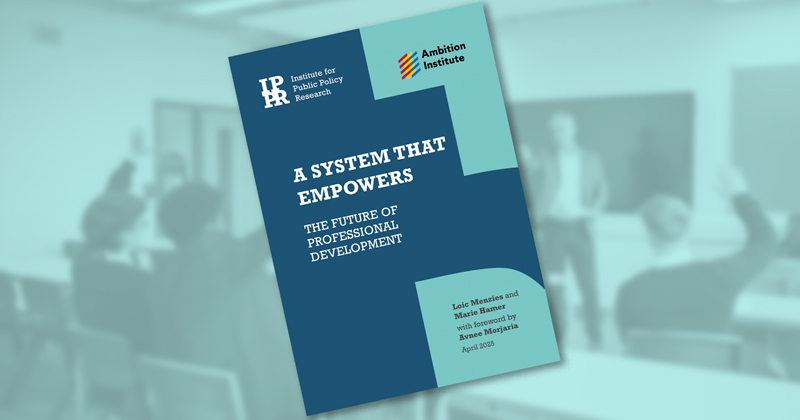“High and rising standards for all” is a noble and ambitious vision, but a vision requires a strategy to become reality. That’s where things get trickier, but a new report by IPPR and Ambition Institute maps out an important part of the journey.
If Bridget Philipson’s vision was ‘decent standards for most’, she could just pursue the same strategy that governments have opted for over the past couple of decades: clear expectations, tight oversight and firm intervention.
Moving to the next level will require going beyond that. To deliver her ambition, Phillipson’s DfE will need to usher in the era of professional empowerment.
So what would a system that empowers look like?
In our report, Marie Hamer and I argue that strategic investment in teachers’ professional expertise would unleash a powerful cycle of improvement, providing a welcome alternative to governments’ historic fixation on carrots and sticks.
But for this to be possible, the professional development system needs to become a system. This will require a number of shifts.
Sharing know-how
First, the teaching profession’s knowledge and wisdom needs to be continually developed and refined. As Ben Glover from the think tank Demos argues “knowledge is hard to come by and without it we cannot deliver effective public services”.
The establishment of the EEF means there has been huge progress in this area but there is further to go. Our system should capture, codify and share what Gert Biesta refers to as ‘practical wisdom’, encompassing teachers’ contextual judgement, based on classroom experience and their professional values.
This type of knowledge capture needs to take place at scale, using sufficiently robust and critical approaches to avoid the risk of poor-quality evidence driving unjustified fads. These insights should contribute to the ‘know-how’ elements of the DfE’s content frameworks.
Layering provision
Second, we need a thriving ecosystem of high-quality providers who can disseminate this knowledge. Only then can universal access to professional learning be combined with space for choice, along with maximum impact.
Given the need to deliver at scale and the degree of quality assurance required , ‘golden thread’ programmes should continue to be offered by national organisations. However, funding should also be directed towards smaller, local or specialist providers – including trusts, local authority-based networks and hubs, and subject associations.
By ensuring these providers can access funding streams (perhaps via the DfE’s regional teams), the government can cultivate a strong pipeline of expert organisations for the future, while nurturing supportive local networks.
Devolving control
Third, government must relinquish its inherent desire to control everything from the top. Instead, quality assurance and oversight should be robust but proportionate.
It’s perfectly reasonable for national providers to go through an extensive procurement process along with ongoing monitoring, but onerous processes risk crushing smaller, regional providers.
Over time, the system should become increasingly self-managing. As quality rises and the sector’s understanding of effective professional development grows, the need for oversight will recede.
A first step in handing over control would be to introduce open applications to expert advisory groups. Simultaneously, the DfE should work with sector bodies to agree a set of system priorities which its disparate funding streams could be directed towards.
Strategic planning
Fourth, robust infrastructure cannot be built on shifting sands. The DfE needs to put professional development on a long-term footing.
One no-brainer would be to free up the substantial resources currently locked up in the growth and skills levy (previously known as the apprenticeship levy), to provide long-term funding for new short-course professional qualifications.
Targeted support
Finally, a well-functioning system needs capacity, but at the moment scarce funding and time can prove insurmountable barriers to professional learning.
Tackling this requires action well beyond the professional development system. However, a step in the right direction would be for the DfE to allocate capacity grants to schools in the most challenging circumstances so that more teachers can access rich development opportunities.
Labour rightly put professional development at the heart of its 2024 education manifesto. To deliver its promised training entitlement, it must be embedded in a system that empowers the profession.
These proposals can take us there.
Read the full report, ‘A system that empowers‘ here








Your thoughts